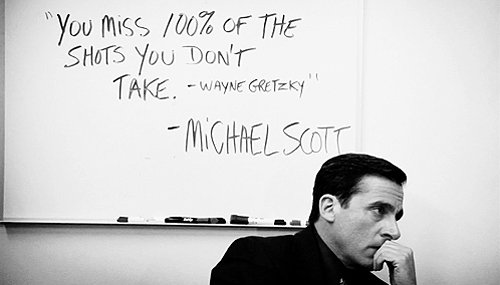HOLD UP. Before I continue the discussion, we need to clarify something … my main point!
There are a couple of times in your response where you refer to the principle of non-violence I alluded to as “your principle”. Specifically, after stating your Principle of Minimal Suffering, you write “Why is this better than your principle of non-violence?”. It is not my principle. The point of bringing it up was to show that I grew up thinking with this principle, in an absolute, axiomatic moral universe, but only to realize that’s really not how the world works. So when you’re claiming that my main point is the principle of non-violence, and arguing against “my reasoning”, you have misread my intentions. And lets clarify them: my point is that any moral principle you take, whether it be on vegetarianism or honesty, doesn’t always hold true — there is always a ton of grey area. And after realizing that I was fooling myself of this fact, my moral universe collapsed and among other revelations, I understood that being a vegetarian was more of a default choice as a result of my upbringing rather than an active moral decision. Since that’s all cleared up, I think Jorge needs our help.
“Define morality!” Jorge exclaims, while pondering his purchase at the cash register.
You’re right Jorge, we should probably do that. I would define it as a “system of principles that guides one’s behaviour based on what is wrong and what is right”. And this notion of rightness and wrongness is a mesh of rational reasoning and intuitive feelings. Stealing candy from your buddy feels wrong. And also, rationally speaking, you wouldn’t want your buddy to steal from you, so you don’t steal from him.
Now with this in mind, let’s discuss another important notion that influences our eating decisions and that is … utility! We like things that make us feel good. Things that taste good. Things that give us utility. So when we’re talking moral principles and “practicality”, as you alluded to, it really comes down to balancing the utility of eating yummy food and the utility of sticking to a moral principle. (I realize there are other reasons people would eat meat other than taste, but I’m oversimplifying purposefully for the sake of the argument). Now, I’m not saying they have to be mutually exclusive. You can certainly eat yummy food and stick to a moral principle. So when we’ve concluded earlier that morality is relative and highly individualistic, it becomes more about defining a principle that you extract enough moral utility, but still eat enough yummy food. Some people extract more utility from an extreme moral stance, like veganism, or some people are apathetic to the ethics of the issue all together and stick with the default habit they were born into. It comes down to a highly subjective mix of rational arguments meshed with emotional intuitions and instinctive, hedonistic desires. And everyone has a different combination.
“A moral stance that favours actions which minimize the suffering imposed on other conscious beings.”
This is yours. And that’s cool! I respect the arguments you bring forward to why you chose this and even the statement itself. But, I think I need to help you out with some fact checking on the current sentiment of the scientific community with respect to consciousness in non-human animals. Recently there was a gathering of an international group of cognitive neuroscientists, neuropharmacologists, neurophysiologists, neuroanatomists and computational neuroscientists at the University of Cambridge. This gathering is known as The Cambridge Declaration on Consciousness. And this is the declaration they made:
“The absence of a neocortex does not appear to preclude an organism from experiencing affective states. Convergent evidence indicates that non-human animals have the neuroanatomical, neurochemical, and neuropsychological substrates of conscious states along with the capacity to exhibit intentional behaviours. Consequently, the weight of evidence indicates that humans are not unique in possessing the neurological substrates that generate consciousness. Non-human animals, including all mammals and birds, and many other creatures, including octopuses, also possess these neurological substrates.”
Consciousness is prevalent in many more species other than mammals. And, what is especially relevant for you is that this declaration includes birds! So where does that leave you Valentin? Is it time to recalibrate your moral utility?

